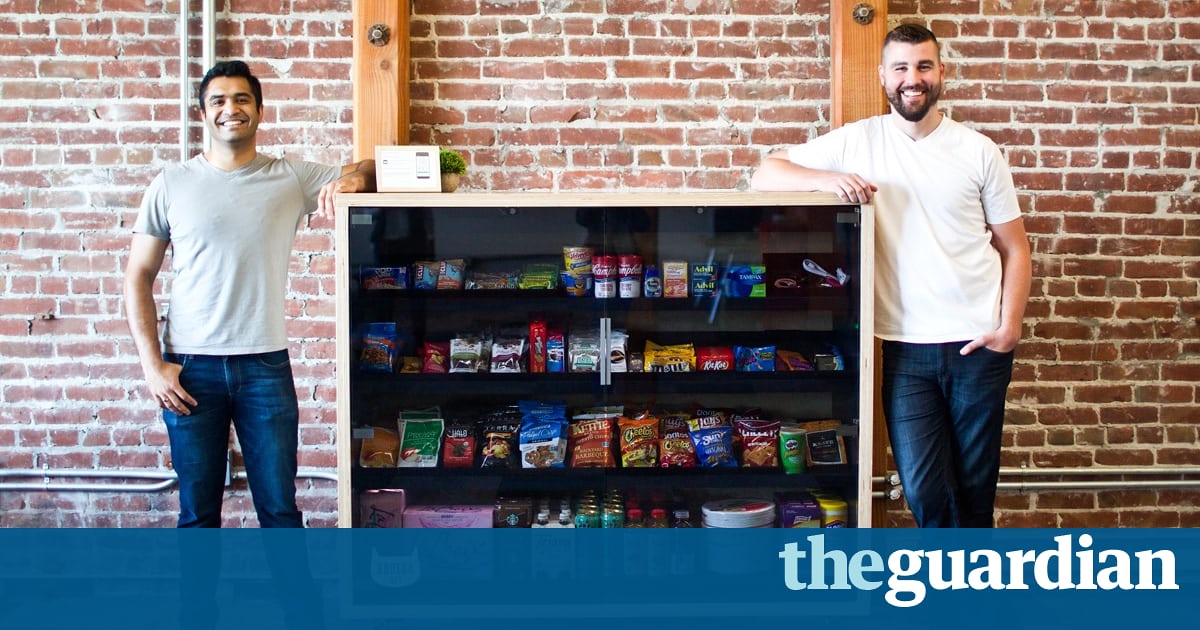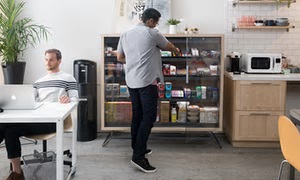Fury at ‘Bodega’ tech startup that aims to put corner shops out of business

Bodega, which markets glorified vending machines where users can buy groceries, boasts: “Eventually, centralized shopping locations won’t be necessary.”

A tech startup called Bodega that hopes to replace mom-and-pop shops with unmanned boxes that rely on an app and artificial intelligence is facing a massive backlash from immigrant business owners and skeptics across Silicon Valley.
The company, founded by two former Google employees and launched on Wednesday, is marketing five-foot-wide pantries that users can unlock with their smartphones to pick up non-perishable items. There are no humans at the stores which are already stationed in spots like apartment buildings, offices and gyms and a computer program automatically charges customers credit cards, according to Fast Company, which first reported on the startup.
[AdSense-A]
Although the boxes appear to be little more than glorified vending machines, the company’s executives have been widely mocked, and criticized for explicitly stating that their mission is to displace neighborhood corner stores and put family-owned shops out of business.
“The vision here is much bigger than the box itself,” co-founder Paul McDonald, a former Google product manager, told Fast Company. “Eventually, centralized shopping locations won’t be necessary, because there will be 100,000 Bodegas spread out, with one always 100 ft away from you.”
McDonald backtracked on Wednesday, claiming in a blogpost that he is not trying to put bodegas out of business despite his earlier statements to the contrary: “Challenging the urban corner store is not and has never been our goal.”
The goal of disrupting a long-running industry and eliminating human interaction from the process of shopping at a convenience store is embedded in the roundly ridiculed Bodega name, which appropriates a commonly used term in the US for corner stores typically run by immigrants.
“It’s sacrilegious to use that name, and we’re going to do whatever we need to do to fight this,” Frank Garcia, chair of the New York State Coalition of Hispanic Chambers of Commerce, told the Guardian. “It was devastating to find out and it’s not fair to the local bodegas now that don’t have the angel investors that these guys have.”
McDonald and co-founder Ashwath Rajan have secured funding from high-profile players in the tech industry, including investors from First Round Capital, Forerunner Ventures and Homebrew and senior executives at Facebook, Google, Twitter and Dropbox, Fast Company reported.
Garcia said his grandfather was the head of the Latin Grocery Association in the 1960s and helped coin the term bodega, a name widely used for stores in New York City today.
“It’s his legacy and the legacy of these immigrants who came here with nothing to start a little grocery store, and came up with a concept to really help the community against racism,” he said, noting that existing grocers often would refuse to serve Puerto Ricans. “Don’t use our community to make a fast buck.”
McDonald claimed that the company conducted surveys in the Latin American community to understand if they felt the name was a misappropriation of that term or had negative connotations and alleged that 97% said no.

Bodega did not respond to an interview request and did not answer questions about the nature of the survey and how much funding the startup has raised.
In his blogpost, McDonald praised existing bodegas as fixtures of their neighborhoods for generations that stock thousands of items, far more than we could ever fit on a few shelves. He also said he was surprised by the social media outrage about the name, offering an apology to “anyone we’ve offended.”
“Rather than disrespect to traditional corner stores or worse yet, a threat we intended only admiration.”
He did not respond to a question about whether he was reconsidering the name.
Critics have also condemned Bodega as the latest example of Silicon Valley entrepreneurs attracting large sums of money to provide a service for which there is little demand, aimed at catering to a wealthy population. Juicero, a startup that raised $120m to sell $400 juicer machines that were revealed to be the equivalent of two hands squeezing a juice box, recently shut down.
McDonald told Fast Company he was unveiling 50 new locations on the west coast and plans to spread across the country, with more than a thousand Bodegas in place by the end of 2018. The boxes are supposed to use machine learning to assess which items are most in demand and adjust the supply accordingly, but some critics are already questioning whether the business model will be sustainable.
“Even if Bodega rapidly grows, many shoppers won’t want to abandon their local stores,” said Trisha Chakrabarti, senior program and policy manager at Mandela MarketPlace, a nonprofit that supports local grocery stores and is based in Oakland, California, where Bodega is headquartered.
“It’s about having neighbours in your community who know you, who have lived there and been in business for a long time, who have seen changes in the neighborhood and are responsive to customers needs,” she said. “That kind of personalization of service, you will never be able to find with an automated service.”
“Bodega is launching at a time when local bodegas are barely scraping by,” said Chakrabarti. These are marginalized business owners to begin with in places like Oakland, New York and San Francisco. Their businesses are threatened by ever increasing rents.
She said she was particularly shocked to see the startup founders openly boasting about striving to wipe out this industry: “I hope that they fail.”
“In New York, where there are a large number of Yemeni-owned corner stores, some are known for using honour systems in which they let regular customers pay at a later date if they are low on cash and have immediate needs,” said Debbie Almontaser, board president of the Muslim Community Network.
“They work with communities when they don’t have money, people living paycheck to paycheck that need milk and diapers,” she said. “All of their customers are just so grateful that they have this kind of trust in them … I can’t imagine they would want to see these manufactured little kiosks in their communities.”
Garcia said his organization would explore any legal options it may have to challenge Bodega’s name, adding that he hoped lawmakers would regulate this kind of business and not let the startup bypass government rules existing stores have to follow.
He noted that even when 7-Eleven, the chain of convenience stores, has moved into neighborhoods with small businesses, executives have met with community leaders and representatives of bodegas.
“At least they respected the community,” he said. “These guys have not.”
At one residential skyscraper in San Francisco where a Bodega box is, tenant Nripesh Koirala said he would consider shopping from one since it’s convenient, but that he didn’t think the startup would threaten retail shops.
“It’s just their arrogance if they’re saying they are going to replace stores,” said Koirala, a 23-year-old student. “At a corner store, there are a lot of things you can choose from and you can ask them questions … You can’t talk to a vending machine.”
Contact the author: sam.levin@theguardian.com
Read more: https://www.theguardian.com/technology/2017/sep/13/tech-startup-bodega-corner-stores